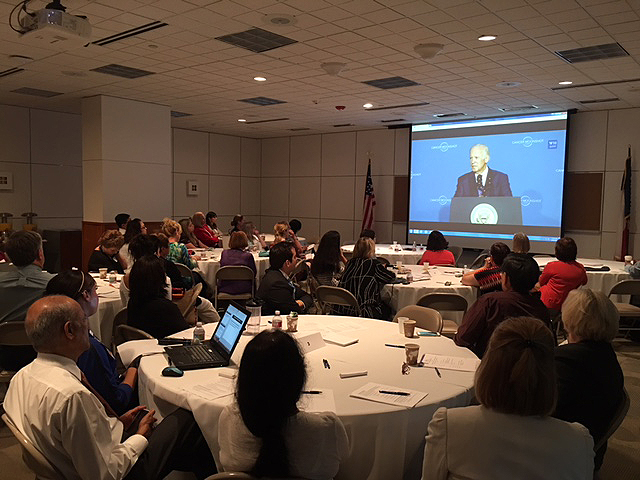How to improve the prevention and treatment of cancer was the focus of the Cancer Moonshot Summit July 29, hosted by the Cancer Therapy & Research Center of the UT Health Science Center San Antonio.
The regional event was part of a national initiative held at more than 270 similar summits throughout the United States June 29 to give the community, including cancer researchers, physicians, patients, advocates, survivors, foundations and philanthropists, a formal mechanism to engage in the initiative, and to generate ideas and commitments to accelerate cures.
At the CTRC, as at other summit sites, roundtable discussions were held to talk about such topics as listening to patient concerns, helping more patients access care, identifying exemplary models for assisting patients with navigating treatment, facilitating second opinions, financing care for low-income patients, funding pediatric cancer clinical trials when cures are needed for so few patients who have the disease, and how the community can support patients’ needs on their cancer journey.
One local cancer survivor spoke of the need to incorporate nutritional counseling into cancer care, while a breast cancer patient advocate said better insurance coverage that is easier for patients to find and purchase is important. A pediatric cancer doctor noted that a large team usually supports the families of pediatric cancer patients and was surprised to learn that this does not automatically happen for adult cancer patients. Meanwhile, at other tables, cancer researchers discussed how to pool resources for research and participants from diverse communities discussed cultural and income barriers to health education and receiving care.
A summary of the main points from San Antonio will be sent to the National Cancer Institute’s blue ribbon panel, the National Cancer Advisory Board, for review and prioritization.
The Cancer Moonshot Initiative was announced in January by President Barack Obama in his State of the Union address and was assigned to Vice President Joe Biden when he declined to run for the presidency after losing his son, Beau, to brain cancer.
“This is similar to when President (John F.) Kennedy announced in 1961 that we would put a man on the moon in less than a decade,” said CTRC Director Ian Thompson, M.D., in his opening remarks.
Instead of putting a man on the moon, the goal of the Cancer Moonshot is to accelerate research toward a cure for cancer so that the nation will achieve in five years what would ordinarily take 10.
“We are hoping to look outside the box at innovation. Millions of people and their families are depending on you,” Dr. Thompson told more than 50 local participants.
In a live speech broadcast simultaneously to all summit locations, Biden said that no matter where he has gone in the world since January, those countries’ leaders want to participate in finding a way to prevent and treat cancer. He said, for all of these people, days, minutes and seconds matter, as people hope to live long enough to welcome a new grandchild, walk a daughter down the aisle at her wedding or see a child graduate.
“Five years ago cancer researchers were not routinely working with geneticists, immunologists and chemical engineers,” he said, but they are now. He said that from his many discussions with cancer leaders, the country is on the cusp of finding cures if we work together.
Biden words summed it up: “It’s time to do something big. We need to make a decade’s worth of progress in the next five years.”


